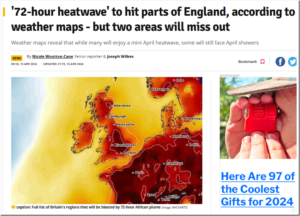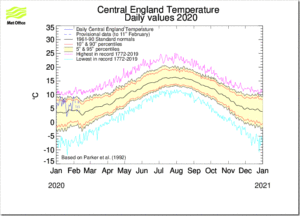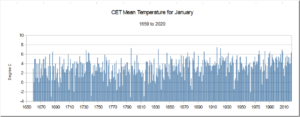by R. Barmby, Nov 03, 2025 in ClimateChangeDispatch
Centuries-old thermometer records show central England warmed 2°C in 40 years—twice the rate of modern warming.

No one would fault you for believing that between 1980 and 2020, we experienced a warming of the climate at a rate that is unprecedented in the last 2,000 years. [some emphasis, links added]
That widespread claim is based on reconstructed (non-thermometer) temperatures up to 1850 and observed (thermometer) temperatures thereafter.
However, sealed thermometer technology predates 1850 by approximately 200 years, and when that data is used, the widespread claim melts away.
Take a close look at the chart below: it is the longest thermometer record in the world, dating back to 1659. The data were compiled by the MET Office, the United Kingdom’s national meteorological service.
With three and a half centuries of instrument data, it transcends being a weather record; it is a climate change record for central England.
The temperature readings were taken on multiple thermometers by many different people, who were probably considered the techies in their day, and none of whom were employed to prove that human influence was warming the planet.
Compare the 40-year temperature trends (black dashed line) of 1695 to 1735 to those of 1980 to 2020.
The warming trend from 1695 to 1735, 2°C over four decades, was double that of 1980 to 2020, at 1°C over four decades.

The earlier warming period was preindustrial—an era whose technology was epitomized by humans circling the globe in wooden sailing ships. Spaceships orbiting the planet, along with heavy manufacturing and prodigious energy production, mark the latter period.
Earlier Englishmen survived from 1695 to 1735, experiencing twice the warming of the last 40 years, and with much less technology.
Had King George II been asked if warming in central England during his reign by 2°C in 40 years was an existential threat to his kingdom, he might reply instead that it was a time of plenty that resulted in English domination.
George II chased Bonny Prince Charles out of Scotland, the French out of North America, and the Spanish around the globe just because they cut off an English naval captain’s ear.
There was no hysteria over the 2°C warming in the early 1700s in Great Britain, even though there were many cultural similarities to today’s global community.
…















